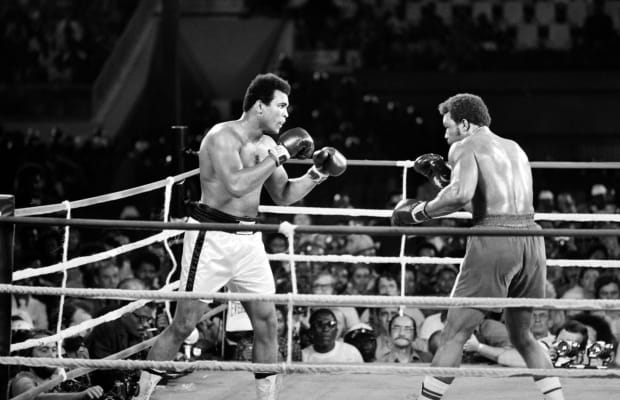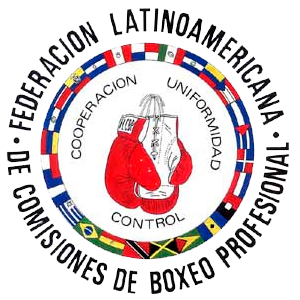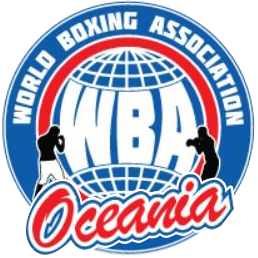“Ali understood that, to be great, he needed an outside force. If you fight for yourself, it’s you against others, and that motivates you, but it will never be with the strength that Ali had. Muhammad fought for more than just himself. He fought for God; his mission was very important…” (A reporter from Sports Illustrated).
The following note was written some time ago, on the occasion of an anniversary of the most anticipated fight in boxing history: the confrontation between the legendary Muhammad Ali and George Foreman in Kinshasa, Zaire, now the Democratic Republic of Congo. It can only be compared to Ali’s fight against Joe Frazier at Madison Square Garden in New York on March 8, 1971, which Frazier won by a close decision.
We republish this text because today, October 30, marks the 50th anniversary of that epic battle, the first in Africa for a world title, which the famous promoter Don King dubbed “Rumble in the Jungle.” It ended in 8 rounds with the unexpected victory of Ali, surprising the approximately 300 million viewers worldwide—at that time, the largest audience in the history of a sporting event—and astonishing those who filled the 20 May Stadium.
We continue with the quoted text, only with slight and irrelevant modifications.
The story we will recount occurred in scorching heat, between 3:00 and 4:00 a.m. on Wednesday, October 30, 1974—about 5-6 hours ahead of Eastern Time in the U.S., Europe, and several countries in South America—at the 20 de Mayo Stadium in Kinshasa, the former Leopoldville, capital of Zaire, now the Democratic Republic of Congo, in Central Africa.
The venue’s capacity of about 60,000 people was nearly doubled, with most spectators being fervent fans cheering for the 32-year-old challenger, Muhammad Ali, who was 1.91 m tall and weighed 216 pounds. They supported him, especially during the 23 minutes and 58 seconds of action, in his bout against Foreman, who was of the same height and weighed 220 pounds, 7 years younger, and the reigning World Boxing Association and World Council heavyweight champion, chanting in the native Lingala language, “Ali, bumaye! Ali, bumaye!” (“Ali, kill him! Ali, kill him!”).
THE TRIUMPH OF INTELLIGENCE
The fight was made possible by the shrewdness of a then-moderately known promoter who would eventually become mythical: the always smiling Don King, known for his wild hair, who began to gain recognition through this boxing spectacle.
Without a penny in his pocket, King managed to “hook” the dictator Mobutu Sese Seko, who had been in power since 1969 and was deposed in 1997. Mobutu agreed to be the financier and contributed $10 million for the opponents, equally divided—an unparalleled purse.
The 25-year-old champion had never lost in 40 appearances, with 23 KOs in a row and only 3 wins by decision. Among his victories were a 2-round victory over Joe Frazier (January 22, 1973) in Kingston, Jamaica, to win the belt, and defenses resolved in 2 minutes each against Puerto Rican José “King” Román (September 1, 1973) in Japan and Ken Norton (March 26, 1974) during the inauguration of the Poliedro in Caracas, Venezuela.
With such a performance, Foreman stepped into the ring with the odds in his favor, against an opponent he was favored to beat at a ratio of 10-1. Ali had a record of 47-2-0. His defeats were by decision: the first against Joe Frazier on March 8, 1971, at Madison Square Garden in New York, in an attempt to regain the title he had been stripped of in April 1967 for refusing to go to the Vietnam War—a position that cost him 3 and a half years of fighting—and the other against Ken Norton in March 1973. He earned the right to fight in Africa with a tough victory by decision over Frazier in January of that year.
We remember the old scenes that are never erased. We saw Foreman in red trunks jumping like an enraged lion, initiating a style and rhythm of fight that never changed: he pushed and attacked, head down, against an Ali in white shorts, who protected himself with his gloves over his face and suddenly threw two quick hooks, a straight punch, and a few uppercuts while leaning back against the ropes. This tactic, known as “rope-a-dope,” involved holding the champion’s neck with his right or left glove.
In that relentless exchange, filled with Foreman’s aggressive but ineffective offense and Ali’s skill and calm demeanor, the fight lasted until the eighth round.
In that round, an already exhausted Foreman, worn out from throwing aimless punches, buried his head once more. Ali struck decisively. He clinched again, stepped back, and struck two or three more times. With mere seconds left in the round, the challenger unleashed a decisive attack. He rocked his opponent with a left to the head, followed by a right, a combination of both hands, and suddenly: BAM! The right glove hit its target, and Foreman began a slow, dramatic descent to the canvas, like a heavy bag of cement, while the stadium shook with the euphoric screams of the thousands in attendance. The champion got up precariously, with wobbling legs. But by then, the referee, former Harlem Globetrotter Zachary Clayton, had completed the fateful 10-second count at 2:58.
The dramatic conclusion was, without a doubt, the triumph of intelligence over strength, a notion reinforced after watching the tape of the contest, advertised by King as the “Rumble in the Jungle.”
An additional fact: in the initial 7 rounds, Ali had the advantage on the scorecards of the referee and the two judges (nowadays, as is known, the referee does not vote, and 3 judges score). Zachary Clayton had it 68-66, while judges Nourridine Adalla (Tunisia) and James Taylor (USA) scored it 70-67 and 69-66, respectively, for Ali.
Today, one of the protagonists is no longer with us: the winner, Muhammad Ali, who “floated like a butterfly and stung like a bee,” the “greatest and most beautiful of all boxers,” as he proclaimed himself. He defied the political power of the USA by refusing to join the army in 1967 because “no Vietcong has called me a nigger, and I will not kill any of them,” and he continued to fight for civil rights and his religion, Islam. After the fight, he remained active until 1981. Sick with Parkinson’s disease since 1984, he died at the age of 74, more than two decades after his diagnosis. The cause of death was septic shock (a serious bodily infection that causes a sharp drop in blood pressure) on June 3, 2016, at a hospital in Scottsdale, Arizona.
Foreman, nicknamed “Big George,” now 75 years old, lives in his native Texas. After losing to Ali and recovering from the disappointment and trauma of failure, he continued in the ring, winning 36 more fights, 29 by KO, with four losses, until November 1997, when he lost to Shannon Briggs. He retired with 76 wins, 68 by KO, and 5 setbacks, one by KO. Today, he is a successful businessman in the meat industry, with a well-earned reputation as a remarkable cook.

















